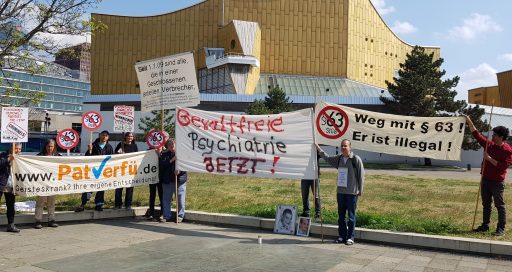Remembrance and Resistance Day: The professional consensus is broken!
As we have been doing since 1995, we started the annual T4 protest march on the “Day of Remembrance and Resistance” on May 2, 2022 at the T4 Memorial Plate, Tiergarten St. 4, in Berlin.
So also this year we gathered in Tiergartenstr. 4, moved to the shrink-organisations headquarters and further to the federal office of the FDP liberal party, in whose hands is the Federal Ministry of Justice, both in Reinhardstrasse. See the prictures of the protest here.
This comment was read out:
The professional consensus is broken!
Since the Foucault Tribunal in 1998, our stuggle aganist coercive psychiatry has achieved decisive success. Even if the special legal regulations of coercive psychiatry have not yet been eliminated and we continue to be discriminated against in terms of human rights, there is, however, an opt-out possibility through the PatVerfü. It is therefore possible to immunize oneself against the coercion and violence of coercive psychiatry. Therefore we must continue to enforce the goal with the legislators politically that the psychiatric special laws are all eliminated and only the opt-in possibility remains, so that one may be held and treated thus only by a positive advance directive explicitly agreed beforehand and in writing the willingness to endure compulsory psychiatric measures, including compulsion and force. We are currently making this demand known with our signature collection at Change.org: tinyurl.com/againstcoercion
The great news is that a significant part of psychiatry, the so-called social psychiatry organized in the German Society for Social Psychiatry (DGSP) has passed a resolution that §§ 63, 64, 20 and 21 of the German Criminal Code (StGB) should be abolished. In other words, it has abandoned the previously existing professional consensus that medical professionals can supposedly determine “illness-related” incapacity for guilt that would make people a danger to others. As if this were a matter of hereditary biology, the Nazis had introduced this into jurisprudence in 1933 as special psychiatric legislation.
At the same time, this also removes the legitimizing ground for psychiatric coercive measures, which are used in non-forensic psychiatry to punish people without having committed a crime, because these are then only sanctions that deprive people of their freedom or even injure their bodies on the basis of arbitrariness, which are prohibited both by the UN Convention on the Rights of Persons with Disabilities and by Articles 1 and 2 of Basic German Law. Therefore, the motto of our Remembrance and Resistance Day this year was:
Nonviolent Psychiatry! Down with § 63!
(This is the German § for the insanity defence and unlimited forensic improsonment and forced treatment)
(This is the German § for the insanity defence and unlimited forensic improsonment and forced treatment)
These two cracks in the ruling system, both, the end of the professional consensus and the possibility to preventively evade the coercive measures, have irrevocably shattered the psychiatric foundation. As a ruin, coercive psychiatry still has a period of grace until it will finally be completely demolished and all special psychiatric laws will have become a thing of the past.

 English
English Русский
Русский עברית
עברית Schweiz
Schweiz Italien
Italien Polski
Polski